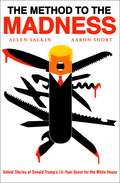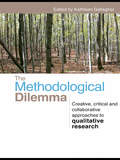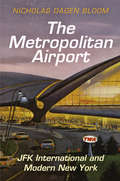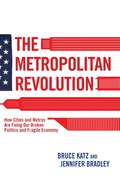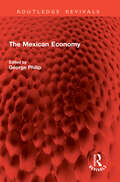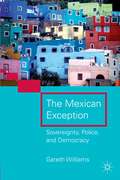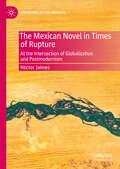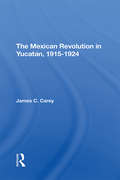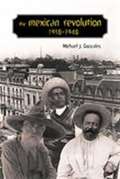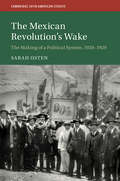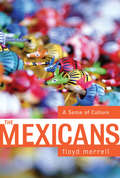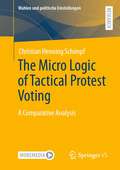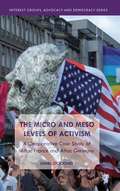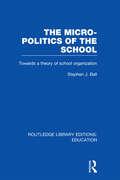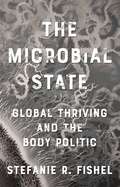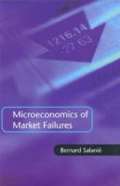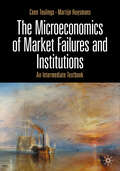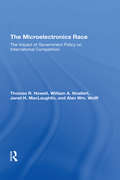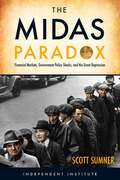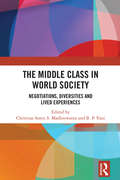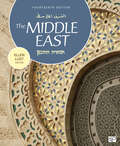- Table View
- List View
The Method of Freedom
by Paul Sharkey Errico Malatesta Davide TurcatoFor sixty years, Errico Malatesta's involvement with international anarchism helped fuel the movement's radical approach to class and labor, and directly impacted the workers' movement in Italy. A talented newspaper journalist, Malatesta's biting critiques were frequently short and to the point-and written directly to and for the workers. Though his few long-form essays, including "Anarchy" and "Our Program," have been widely available in English translation since the 1950s, the bulk of Malatesta's most revolutionary writing remains unknown to English-speaking audiences.In The Method of Freedom, editor Davide Turcato presents an expansive collection of Malatesta's work, including new translations of existing works and a wealth of shorter essays translated here for the first time. Offering readers a thorough overview of the evolution of Malatesta's revolutionary thought during his half a century as an anarchist propagandist, The Method of Freedom explores revolutionary violence and workplace democracy, the general strike and the limitations of trade unionism, propaganda by the deed, and the revolution in practice.Errico Malatesta (1853-1932) was an enormously popular Italian anarchist, perhaps most well-known for his strong support of direct action and the general strike. A talented newspaper journalist and editor, Malatesta spent much of his life exiled from Italy because of his political beliefs.Davide Turcato is a computational linguist and an independent historian. He is the author of Making Sense of Anarchism and the editor of Malatesta's collected works, a ten-volume project currently underway in Italy, to be released in English by AK Press.
The Method to the Madness: Donald Trump's Ascent as Told by Those Who Were Hired, Fired, Inspired--and Inaugurated
by Allen Salkin Aaron ShortA Rosetta Stone for understanding Donald Trump's style, mindset, and every action, made up of over one hundred interviews with his closest associates and adversaries over the last 15 years.To his critics, Donald Trump is an impulsive, undisciplined crackpot who accidentally lucked into the presidency. But in The Method to the Madness, reporters Allen Salkin and Aaron Short reveal that nothing could be further from the truth. This objective, nonpartisan oral history shows that Trump had carefully planned his bid for the presidency since he launched what many considered to be a joke candidacy in 1999.Between 2000 and 2015, when he announced his candidacy in the lobby of Trump Tower, he was able to identify an unserved political constituency, hone a persuasive message that appealed to their needs, and deliver it effectively, despite intense media opposition.Through candid conversations with more than 100 subjects close to the President, Salkin and Short make the case that Donald Trump’s ostensibly erratic approach to politics is consistent with his carefully honed personal and professional style of information gathering, opinion seed-planting, and conclusion sharing. His business, media, and political dealings from this era serve as a guide for understanding the man, his mindset, and his every action.The Method to the Madness is an accessible and unbiased oral history that brings readers into the private rooms where decisions are made, confidences are broken, strong words fly, and not all eye-witnesses see the same scene in quite the same way. Full of scoops both large and small, this is the first book to bring Trump, the politician, into focus.
The Methodological Dilemma: Creative, critical and collaborative approaches to qualitative research
by Kathleen GallagherThis thought-provoking book challenges the way research is planned and undertaken and equips researchers with a variety of creative and imaginative solutions to the dilemmas of method and representation that plague qualitative research. Fascinating and inspiring reading for any researcher in the Social Sciences this comprehensive collection encourages the reader to imagine the world in evermore complex and interesting ways and discover new routes to understanding. Some of the most influential figures in educational research consider questions such as: How does a socio-political context change the course of our research? What counts as a ‘truthful account’ in qualitative research? How do the voices of theory and the voices of ‘research subjects’ struggle to be heard in our research narratives? How can qualitative researchers ethically navigate the difficult terrain of research relationships? How is the material body rendered in qualitative research? Each chapter reveals a range of troubling dilemmas related to the critical aspects of research methodology in the Social Sciences and uses an illustrative case to elucidate the issues encountered by the researcher. Each writer brings a fierce philosophical spirit to her work, showing how methods or techniques of data-gathering grow from the theory and analysis of how research proceeds. A range of topics are addressed in a cross-disciplinary approach which will appeal to all scholars of qualitative research, undergraduate students in education programs and graduate students in a range of disciplines
The Metropolitan Airport
by Nicholas Dagen BloomJohn F. Kennedy International Airport is one of New York City's most successful and influential redevelopment projects. Built and defined by outsize personalities--Mayor Fiorello La Guardia, famed urban planner Robert Moses, and Port Authority Executive Director Austin Tobin among them--JFK was fantastically expensive and unprecedented in its scale. By the late 1940s, once-polluted marshlands had become home to one of the world's busiest and most advanced airfields. Almost from the start, however, environmental activists in surrounding neighborhoods and suburbs clashed with the Port Authority. These fierce battles in the long term restricted growth and, compounded by lackluster management and planning, diminished JFK's status and reputation. Yet the airport remained a key contributor to metropolitan vitality: New Yorkers bound for adventure and business still boarded planes headed to distant corners of the globe, billions of tourists and immigrants came and went, and mammoth air cargo facilities bolstered the region's commerce.In The Metropolitan Airport, Nicholas Dagen Bloom chronicles the untold story of JFK International's complicated and turbulent relationship with the New York City metropolitan region. In spite of its reputation for snarled traffic, epic delays, endless construction, and abrasive employees, the airport was a key player in shifting patterns of labor, transportation, and residence; the airport both encouraged and benefited from the dispersion of population and economic activity to the outer boroughs and suburbs. As Bloom shows, airports like JFK are vibrant parts of their cities and powerfully influence urban development. The Metropolitan Airport is an indispensable book for those who wish to understand the revolutionary impact of airports on the modern American city.
The Metropolitan Revolution
by Bruce Katz Jennifer BradleyA revolution is stirring in America. Across the nation cities and metropolitan areas, and the networks of pragmatic leaders who govern them, are taking on the big issues that Washington won't, or can't, solve. They are reshaping our economy and fixing our broken political system. The Metropolitan Revolution is a national movement, and the book describes how it is taking root in New York City, where efforts are under way to diversify the city's vast economy; in Portland, Oregon, which is selling the "sustainability" solutions it has perfected to other cities around the world; in Northeast Ohio, where groups are using industrial-age skills to invent new twenty-first-century materials, tools, and processes; in Houston, where a modern settlement house helps immigrants climb the employment ladder; in Miami, where innovators are forging strong ties with Brazil and other nations; in Denver and Los Angeles, where leaders are breaking political barriers and building world-class metropolises; and in Boston and Detroit, where innovation districts are hatching ideas to power these economies for the next century. Bruce Katz and Jennifer Bradley highlight these success stories and the people behind them in order to share lessons and catalyze action. This revolution is happening, and every community in the country can benefit.
The Metropolitan Revolution
by Bruce Katz Jennifer BradleyAcross the US, cities and metropolitan areas are facing huge economic and competitive challenges that Washington won't, or can't, solve. The good news is that networks of metropolitan leaders - mayors, business and labor leaders, educators, and philanthropists - are stepping up and powering the nation forward. These state and local leaders are doing the hard work to grow more jobs and make their communities more prosperous, and they're investing in infrastructure, making manufacturing a priority, and equipping workers with the skills they need.In The Metropolitan Revolution, Bruce Katz and Jennifer Bradley highlight success stories and the people behind them.· New York City: Efforts are under way to diversify the city's vast economy· Portland: Is selling the "sustainability" solutions it has perfected to other cities around the world· Northeast Ohio: Groups are using industrial-age skills to invent new twenty-first-century materials, tools, and processes· Houston: Modern settlement house helps immigrants climb the employment ladder· Miami: Innovators are forging strong ties with Brazil and other nations· Denver and Los Angeles: Leaders are breaking political barriers and building world-class metropolises· Boston and Detroit: Innovation districts are hatching ideas to power these economies for the next centuryThe lessons in this book can help other cities meet their challenges. Change is happening, and every community in the country can benefit. Change happens where we live, and if leaders won't do it, citizens should demand it. The Metropolitan Revolution was the 2013 Foreword Reviews Bronze winner for Political Science.
The Mexican Economy (Routledge Revivals)
by George PhilipFirst published in 1988, The Mexican Economy presents a comprehensive survey of the Mexican economy and its problems and argues that the crisis has more complex roots within the Mexican economy. It gives an equal weight to the long-term development of the Mexican economy and to the problems that have arisen since 1982. The contributors discuss issues like debt and oil-led development; Mexico’s 1986 financial rescue; the economic crisis and Mexican labour; the Mexican agricultural crisis; agriculture and environment; industrial decentralisation and regional policy, 1970–1986; Pemex and the petroleum sector; policies of the Mexican government towards NFRM; and Mexico’s maquiladora programme. This book will be of interest to students and researchers of economy, history, and political science.
The Mexican Exception
by Gareth WilliamsThis book examines the question of democracy in post-revolutionary Mexican society. Each chapter recuperates an event or particular historical sequence that sheds light on the relation between culture and sovereign exceptionality. Each moment or sequence stages a relation to language. In these speech scenes there is a disagreement between social actors (for example, disputes between peasants and intellectuals over words such as democracy, equality, freedom, proletariat, worker, revolution etc. ). Democracy in this book is not just a type of Constitution or a form of society that politics affirms on a daily basis. It is the assumption and installation of egalitarian language. Democracy is therefore the momentary interruption or suspension of the police order.
The Mexican Novel in Times of Rupture: At the Intersection of Globalization and Postmodernism (Literatures of the Americas)
by Héctor JaimesThis book offers a close reading analysis of contemporary Mexican authors whose novels, in both form and content, are reshaped by the forces of globalization and postmodernism. Drawing on an interdisciplinary approach, the author examines the works of Jorge Volpi, Yuri Herrera, Guillermo Fadanelli, Eloy Urroz, Julián Herbert, Álvaro Enrigue, Valeria Luiselli, Pedro Ángel Palou, Guadalupe Nettel, Verónica Gerber Bicecci, and Mario Bellatin, exploring the themes of globalization, ethics, history, love, and literary forms. By addressing the critical intersections of these issues, the book makes a timely contribution to the study of contemporary Mexican literature in the context of a rapidly changing world.
The Mexican Revolution In Yucatan, 1915-1924
by James C CareyFocusing on the lives of two revolutionary leaders, Salvador Alvarado and Felipe Carrillo Puerto, this book shows how the Mexican Revolution affected the State of Yucatan, a region that had boasted of its independence from Mexico City and where a dominant social minority had long refused meaningful change for the indigenous population. Dr. Carey co
The Mexican Revolution, 1910-1940
by Michael J. GonzalesThis judicious history of modern Mexico's revolutionary era will help all readers, and in particular students, understand the first great social uprising of the twentieth century. In 1911, land-hungry peasants united with discontented political elites to overthrow General Porfirio Diaz, who had ruled Mexico for three decades. Gonzales offers a path-breaking overview of the revolution from its origins in the Diaz dictatorship through the presidency of radical General Lazaro Cardenas (1934-1940) drawn from archival sources and a vast secondary literature. His interpretation balances accounts of agrarian insurgencies, shifting revolutionary alliances, counterrevolutions, and foreign interventions to delineate the triumphs and failures of revolutionary leaders such as Francisco I. Madero, Pancho Villa, Emiliano Zapata, Alvaro Obregon, and Venustiano Carranza. What emerges is a clear understanding of the tangled events of the period and a fuller appreciation of the efforts of revolutionary presidents after 1916 to reinvent Mexico amid the limitations imposed by a war-torn countryside, a hostile international environment, and the resistance of the Catholic Church and large landowners.
The Mexican Revolution’s Wake: The Making of a Political System, 1920–1929 (Cambridge Latin American Studies #108)
by Sarah OstenThroughout the 1920s Mexico was rocked by attempted coups, assassinations, and popular revolts. Yet by the mid-1930s, the country boasted one of the most stable and durable political systems in Latin America. In the first book on party formation conducted at the regional level after the Mexican Revolution, Sarah Osten examines processes of political and social change that eventually gave rise to the Institutional Revolutionary Party (PRI), which dominated Mexico's politics for the rest of the twentieth century. In analyzing the history of socialist parties in the southeastern states of Campeche, Chiapas, Tabasco, and Yucatán, Osten demonstrates that these 'laboratories of revolution' constituted a highly influential testing ground for new political traditions and institutional structures. The Mexican Revolution's Wake shows how the southeastern socialists provided a blueprint for a new kind of party that struck calculated balances between the objectives of elite and popular forces, and between centralized authority and local autonomy. Includes a four-state comparison of socialist parties in Southeast Mexico, which contributes a truly regional perspective to a field dominated by locally-specific histories. Addresses the origins of Mexico's idiosyncratic post-revolutionary political system, and facilitates comparisons with histories of state-formation elsewhere in the world. Highlights the political histories of less-studied states in Mexico, and offers background on relevant figures and events, complicating and enriching previous interpretations of this history with new data.
The Mexicans: A Sense of Culture
by Floyd MerrellExplores Mexico's' diverse cultures, and the cultures of Latin America including AmerIndian, African-American, European, and ethnically diverse groups, beginning with the conquest and colonization. This historical overview of Mexico focuses on understanding the daily life of the country, including its complex artistic, political, economic, and social patterns
The Micro Logic of Tactical Protest Voting: A Comparative Analysis (Wahlen und politische Einstellungen)
by Christian Henning SchimpfThis book identifies the different forms that protest voting can take in times when populism flourishes. Contrary to the popular view of protest voting as merely venting frustration, this book argues that protest voting can also be conceived of as a strategic signal of discontent, originating from sources, such as party policy positions. The empirical analyses rest on election survey data collected in democratic countries around the world between 2005 and 2017 to understand protest voting as a strategic signal, and the conditions under which it occurs. The main results show that protest voting can indeed be a strategic signal. This finding challenges the predominant view in the literature and the public discourse of protest voters as aimless, frustrated voters.
The Micro and Meso Levels of Activism
by Daniel StockemerFocusing on the Attac movements in France and Germany, this book seeks to explain the dramatic differences that exist between the individual and organisational levels of activism. The author derives engagement patterns for various types of activists and develops a typology of social movement organisations positing possible trends in membership.
The Micro-Politics of the School: Towards a Theory of School Organization (Routledge Library Editions: Education)
by Stephen J. BallStephen Ball’s micro-political theory of school organization is a radical departure from traditional theories. He rejects a prescriptive ‘top down’ approach and directly addresses the interest and concerns of teachers and current problems facing schools. In doing so he raises question about the adequacy and appropriateness of the existing forms of organizational control in schools. Through case studies and interviews with teachers, the book captures the flavour of real conflicts in schools – particularly in times of falling rolls, change of leadership or amalgamations – when teachers’ autonomy seems to be at stake.
The Microbial State: Global Thriving and the Body Politic
by Stefanie R. FishelFor three centuries, concepts of the state have been animated by one of the most powerful metaphors in politics: the body politic, a claustrophobic and bounded image of sovereignty. Climate change, neoliberalism, mass migration, and other aspects of the late Anthropocene have increasingly revealed the limitations of this metaphor. Just as the human body is not whole and separate from other bodies—comprising microbes, bacteria, water, and radioactive isotopes—Stefanie R. Fishel argues that the body politic of the state exists in dense entanglement with other communities and forms of life. Drawing on insights from continental philosophy, science and technology studies, and international relations theory, this path-breaking book critiques the concept of the body politic on the grounds of its very materiality. Fishel both redefines and extends the metaphor of the body politic and its role in understanding an increasingly posthuman, globalized world politics. By conceiving of bodies and states as lively vessels, living harmoniously with multiplicity and the biosphere, she argues that a radical shift in metaphors can challenge a politics based on fear to open new forms of global political practice and community. Reframing the concept of the body politic to accommodate greater levels of complexity, Fishel suggests, will result in new configurations for the political and social organization necessary to build a world in which the planet&’s inhabitants do not merely live but actively thrive.
The Microeconomics of Market Failures
by Bernard SalaniéIn this book Bernard Salanie studies situations where competitive markets fail to achieve a collective optimum and the interventions used to remedy these so-called market failures. He includes discussions of theories of collective decision making, as well as elementary models of public economics and industrial organization. Although public economics is traditionally defined as the positive and normative study of government action over the economy, Salanie confines himself to microeconomic aspects of welfare economics; he considers taxation and the effects of public spending only as potential remedies for market failures. He concludes with a discussion of the theory of general equilibrium in incomplete markets.
The Microeconomics of Market Failures and Institutions: An Intermediate Textbook
by Coen Teulings Martijn HuysmansThis graduate textbook explores key microeconomic concepts to provide insight into financial markets, comparative economic development, and political institutions. Theoretical concepts are accompanied by historical and real life case studies to highlight the evolution of institutions and the solutions to market failures. General mathematical models are presented in a practical and clear manner and can be applied to problem solving scenarios. Key dilemmas relating to monopolies, institutional design, economic policy, power in society, and the rule of law are also discussed. This multidisciplinary book aims to provide a real world understanding of microeconomics and game theory, enabling readers to review policy and institutional requirements. It will be relevant to students and policymakers interested in institutional economics, the political economy, financial economics, and economic governance.
The Microelectronics Race: The Impact Of Government Policy On International Competition
by Alan Wm Wolff Thomas R Howell William A Noellert Janet H MaclaughlinThis book is dedicated to those individuals in the U.S. Government who have begun to recognize the full implications of the challenge which this country confronts in microelectronics race, and who are beginning to take steps to deal with that challenge.
The Midas Paradox: Financial Markets, Government Policy Shocks, and the Great Depression
by Scott SumnerEconomic historians have made great progress in unraveling the causes of the Great Depression, but not until Scott Sumner came along has anyone explained the multitude of twists and turns the economy took.In The Midas Paradox: Financial Markets, Government Policy Shocks, and the Great Depression, Sumner offers his magnum opus—the ?rst book to comprehensively explain both monetary and non-monetary causes of that cataclysm. Drawing on ?nancial market data and contemporaneous news stories, Sumner shows that the Great Depression is ultimately a story of incredibly bad policymaking—by central bankers, legislators, and two presidents—especially mistakes related to monetary policy and wage rates. He also shows that macroeconomic thought has long been captive to a false narrative, which continues to misguide policymakers in their quixotic quest to promote robust and sustainable economic growth. The Midas Paradox is a landmark treatise that solves mysteries that have long perplexed economic historians and corrects misconceptions about the true causes, consequences, and cures of macroeconomic instability. Like Milton Friedman and Anna J. Schwartz&’s A Monetary History of the United States, 1867–1960, it is one of those rare books destined to shape future research and debate on the subject.
The Middle Ages
by Antonia Fraser John Gillingham Peter EarleA brief and manageable portion of the Fraser-edited and much-touted Lives of the Kings and Queens of England.
The Middle Class in World Society: Negotiations, Diversities and Lived Experiences
by Christian Suter B. P. Vani S. MadheswaranThis volume delves into the study of the world’s emerging middle class. With essays on Europe, the United States, Africa, Latin America, and Asia, the book studies recent trends and developments in middle class evolution at the global, regional, national, and local levels. It reconsiders the conceptualization of the middle class, with a focus on the diversity of middle class formation in different regions and zones of world society. It also explores middle class lifestyles and everyday experiences, including experiences of social mobility, feelings of insecurity and anxiety, and even middle class engagement with social activism. Drawing on extensive fieldwork and in-depth interviews, the book provides a sophisticated analysis of this new and rapidly expanding socioeconomic group and puts forth some provocative ideas for intellectual and policy debates. It will be of importance to students and researchers of sociology, economics, development studies, political studies, Latin American studies, and Asian Studies.
The Middle East
by Dr Ellen M. LustIn the Fourteenth Edition of The Middle East, Ellen Lust brings important new coverage to this comprehensive, balanced, and superbly researched text. In clear prose, Lust and her outstanding contributors explain the many complex changes taking place across the region. New to this edition is a country profile chapter on Sudan by Fareed Hassan. All country chapters now address domestic and regional conflict more explicitly, and all tables, figures, boxes, and maps have been fully updated with the most recent data and information.
The Middle East
by Dr Ellen M. LustIn the Fourteenth Edition of The Middle East, Ellen Lust brings important new coverage to this comprehensive, balanced, and superbly researched text. In clear prose, Lust and her outstanding contributors explain the many complex changes taking place across the region. New to this edition is a country profile chapter on Sudan by Fareed Hassan. All country chapters now address domestic and regional conflict more explicitly, and all tables, figures, boxes, and maps have been fully updated with the most recent data and information.

